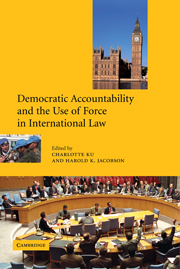Book contents
- Frontmatter
- Contents
- List of figures
- List of tables
- Notes on contributors
- Preface
- List of abbreviations
- I Introduction
- II The domestic and international context
- III Traditional contributors to international military operations
- IV Newcomers to international military operations
- V Permanent members of the UN Security Council
- VI Conclusion
- Appendix A. Uses of military forces under the auspices of the UN and NATO
- Appendix B. Country participation in international operations, 1945–2000
- References
- Index
Preface
Published online by Cambridge University Press: 30 July 2009
- Frontmatter
- Contents
- List of figures
- List of tables
- Notes on contributors
- Preface
- List of abbreviations
- I Introduction
- II The domestic and international context
- III Traditional contributors to international military operations
- IV Newcomers to international military operations
- V Permanent members of the UN Security Council
- VI Conclusion
- Appendix A. Uses of military forces under the auspices of the UN and NATO
- Appendix B. Country participation in international operations, 1945–2000
- References
- Index
Summary
Harold Jacobson died unexpectedly as we neared completion of this book, but Jake and I had finished final drafts of the opening and closing chapters and we had received all the other chapters and worked through them together. So the work remains as it began, a joint effort, codirected and coedited by the two of us.
This project had its origins in an on-going conversation that Jake and I began in late 1995 about the role of international institutions after the end of the Cold War. We both observed that the world had been unprepared for the post-Cold War world, and that this lack of preparation had handicapped the important institutions and powers in handling the problems that emerged after 1991. Since there had been no concept of or opportunity for post-war planning, as there had been during the First and Second World Wars, there was no coherent vision of what the post-Cold War world, including its international institutions, should look like.
We considered what questions demanded an answer, and concluded that an important but not well-understood issue was how democracies maintained accountability to their citizens when they acted under the auspices of international institutions. As Americans, we thought of the rallying cry of the American colonists against Westminster, “No taxation without representation,” as capturing the right of citizens of democratic countries to understand and to shape their country's international obligations.
- Type
- Chapter
- Information
- Publisher: Cambridge University PressPrint publication year: 2003

